 Congratulations on the Faculty of Health & Social Sciences team which had its paper ‘Vital signs and other observations used to detect deterioration in pregnant women: an analysis of vital sign charts in consultant-led UK maternity units’ accepted by the International Journal of Obstetric Anesthesia (published by Elsevier).
Congratulations on the Faculty of Health & Social Sciences team which had its paper ‘Vital signs and other observations used to detect deterioration in pregnant women: an analysis of vital sign charts in consultant-led UK maternity units’ accepted by the International Journal of Obstetric Anesthesia (published by Elsevier).
The paper compares: (i) vital sign values used to define physiological normality; (ii) symptoms and signs used to escalate care; (iii) 24 type of chart used; and (iv) presence of explicit instructions for escalating care. The authors conclude that the wide range of ‘normal’ vital sign values in different systems used in the UK and the Channel Islands suggests a lack of equity in the processes for detecting deterioration and escalating care in hospitalised pregnant and postnatal women. Agreement regarding ‘normal’ vital sign ranges is urgently required and would assist the development of a standardised obstetric early warning system and chart. The lead author of this new paper is FHSS Visiting Professor Gary Smith, his co-authors include FHSS staff Vanora Hundley, Lisa Gale_Andrews and Edwin van Teijlingen as well as three BU Visiting Faculty: Debra Bick (King’s College London), Mike Wee (Poole Hospital NHS Foundation Trust) and Richard Isaacs (University Hospital Southampton).
Category / Health, Wellbeing & Society
The genetics of psychiatric disorders
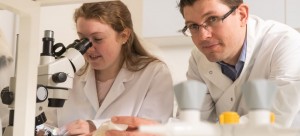
It’s British Science Week 2017 and to celebrate we’re sharing some of our science research stories, to highlight some of the fantastic research taking place here at BU. Today we’re looking at how a team of BU researchers are uncovering the genetics of psychiatric disorders.
While it has long been recognised that genetics – alongside environmental factors – play a role in developing psychiatric disorders, the function of individual genes is still largely unknown. But an international, multi-disciplinary team led by Bournemouth University’s Dr Kevin McGhee is aiming to uncover just that – using fruit flies to isolate and examine the genes involved in the development of schizophrenia, with the hope of improving knowledge and treatments for the condition.
“In psychiatric genetics, a lot of time and money has been invested in large, genomewide studies to find the genes that are involved,” said Dr McGhee, a Senior Lecturer in Health Sciences at Bournemouth University (BU). “Now, we want to find out what the functions of those genes are. If you can do that, the ultimate impact is that you can then design better treatments.” Dr McGhee is the principal investigator of the year-long project, working alongside colleagues from the National University of Ireland, Galway and University of British Columbia, Vancouver.
Students are also playing a part in the Bournemouth University funded project, with a number of dissertation students trained to carry out lab-based examinations of the fruit flies. They will isolate and switch off genes that human data has previously indicated play a role in schizophrenia, before examining the effect on the flies’ nerve cells at different life stages.
“If we can prove that it works and can be applied to human psychiatric genetics, then it helps create a cheap and easy functional model that is beneficial to everyone,” explained Dr McGhee. “I believe what we find out from these genetic studies will help infer what is going on biologically, and that will ultimately lead to better treatment.”
Another strand of the research will help kickstart the use of psychiatric genetic counselling in the UK. Genetic counselling – where patients and relatives are given advice and support around the probability of developing
an inherited disorder – has long been used to assess the risks around conditions like Down’s Syndrome and certain cancers.
A psychiatric genetic counselling workshop – the first of its kind – is being held by the research team. It will explore how best to translate the increasing knowledge about the genetics of psychiatric disorders into educational and counselling-based interventions to improve outcomes for patients and their families.
“Genetic counselling will probably expand over the next ten or 20 years and we want to put BU at the forefront, as a UK leader in the field,” said Dr McGhee, adding that the workshop has already attracted interest from around the world. “I think people having that education and training to be able to explain and support people through diagnosis will lead to better treatments and help reduce that sense of stigma and guilt around
psychiatric disorders.”
Open access publishing is another way in which Dr McGhee believes that the wider public can benefit and learn from research projects. “Impact is really important for research and open access really helps to achieve that – as anyone can see it, whether they are students, doctors, charities, policy makers, whoever,” he said. “I think, hopefully, another impact of this work will be to better show where we are with this research, which again goes back to open access – helping people to see that there are hundreds of markers and hundreds of genes and they each have a very small effect.
“Ultimately, we want to educate the healthcare professionals, policy makers and eventually the public – the patients and families who suffer from psychiatric diseases –
so that they are better informed.”
This article appeared in the 2015 Bournemouth Research Chronicle. Download a copy of the magazine, or view the articles online.
Dr McGee is currently working on the HEIF funded project Psychiatric Genetic Counselling . The project is looking at improving UK psychiatric services by expanding local and regional healthcare professionals’ understanding of the role genetics plays in mental illness. Through Psychiatric Genetic Counselling they’re looking at empowering mental health sufferers and their families.
PPI Seminar 2: How the Public can Inform Research Design – A Case Study
Importance of public involvement in research design: An orthopaedic case study
Lisa Gale-Andrews & Dr Zoe Sheppard
Date Monday 15th March 2017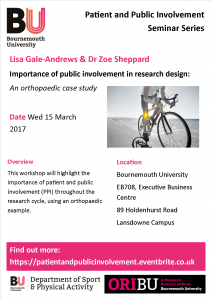
Time 3:00 – 4:30 pm
Location EB708, Executive Business Centre, 89 Holdenhurst Road, Bournemouth University
Overview
This workshop will highlight the importance of patient and public involvement (PPI) throughout the research cycle, using an orthopaedic example.
As part of the Public and Patient Involvement (PPI) in Research seminar series
Book your place now: https://patientandpublicinvolvement.eventbrite.co.uk
Refreshments are available and there will be plenty of time for discussion at the seminar end. Queries please contact:
Dr James Gavin
Email jgavin@bournemouth.ac.uk
Phone +44 (0)1202566303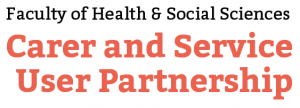
Lifelong health and wellbeing: improving orthopaedic practice and patient care
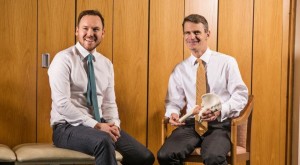
It’s British Science Week 2017 and to celebrate we’re sharing some of our science research stories, to highlight some of the fantastic research taking place here at BU. Today we’re looking at the Orthopeadic Research Institute (ORI).
Living well in older age is increasingly becoming a concern for our society. A key priority for our health services is to enable people to stay healthy and independent for as long as possible. BU’s newly established Orthopaedic Research Institute (ORI) is addressing this need by carrying out research to improve orthopaedic practices and patient care, thus supporting people to improve their activity levels and mobility as they age. Orthopaedics will become a critical issue as our population ages, as longer and more active lives will increase the risk that joints will wear out and replacements or treatments will be needed.
Deputy Head of ORI Associate Professor Tom Wainwright explains: “Knee and hip problems are going to become more prevalent, so we’re going to need better solutions to manage that; whether it’s better surgical procedures or better nonsurgical interventions. We have some very effective treatments in orthopaedics, but they’re not 100% effective, so part of our role is to work out how to make them better – improve them, through developing better surgical techniques, testing new medical techonology or developing better rehabilitation processes.”
Between them, Associate Professor Wainwright and Head of ORI Professor Rob Middleton have a wealth of clinical and research expertise. Professor Rob Middleton is a practising orthopaedic surgeon, specialising in hip replacement, while Associate Professor Wainwright is a physiotherapist and clinical researcher. They carried out research alongside their clinical practice before joining BU and have a national and international reputation for their work to date.
One of their biggest successes so far is speeding up the recovery process after hip and knee surgery, which has led to their work being cited in best practice health guidelines around the world. This approach, called Enhanced Recovery after Surgery, seeks to minimise the impact of surgery and accelerate recovery by employing strategies throughout the patient pathway, to improve outcomes and reduce the need for medical interventions. Their research into this area was a first in the UK for orthopaedics and demonstrated its value to patient care, as well as showing an improvement in patient and staff satisfaction and leading to significant cost savings to hospitals.
A more recent example of their work is a programme developed with local partners in Dorset called CHAIN – Cycling Against Hip Pain – which is designed to help people to live well with conditions such as osteoarthritis and to improve their mobility. The programme provides a combination of education and static cycling sessions,designed to improve mobility and increase people’s confidence in managing their conditions. The results have been excellent, with patients reporting improvements in walking, finding daily living tasks easier and most importantly, decreases in pain. Even the least likely candidates have seen improvements, demonstrating the value of education and exercise in improving patient care and in helping to reduce or delay the need for further medical interventions.
“As well as developing interventions to help patients recover from surgery and manage their conditions. We also work with a number of global orthopaedic companies to test and run clinical trials
on the latest orthopaedic technology,” says Associate Professor Wainwright. “We work with companies such as ZimmerBiomet, Lima Corporate, and Firstkind Ltd to ensure that their technology is delivering the best possible outcomes for patients.”
One example of their work with ZimmerBiomet was to explore ways to improve the technology used in hip replacements. The hip joint is a ball and socket joint and one of the risks of hip replacement is dislocation; where the new ball comes out of the socket. ORI’s research has shown that a larger ball reduces the risk of dislocation, and does not adversely affect the rate of wear.
“We currently have five trials underway within local hospitals and more to come,” explains Associate Professor Wainwright. “These trials are looking at different ways that we can improve the medical technology used in orthopaedics and means that not only are we contributing to improving future care, but we’re also bringing the latest technology to Dorset and improving care in the local area. As Dorset has a very high proportion of orthopaedic surgeries, there is potentially a very large group of people we can benefit.”
“We take a very interdisciplinary approach to our research. Establishing ourselves within BU is a real advantage for us, because we can draw on the expertise of colleagues in other areas of research, including other health professionals, psychologists, technologists and engineers,” explains Associate Professor Wainwright, “Ultimately, our driving force is that we wantto ensure that everyone gets the best possible treatment for their condition – it’s just the right thing to do.”
ORI was established at BU thanks to generous funding from the Dorset Local Enterprise Partnership (LEP).
This article appeared in the 2016 Bournemouth Research Chronicle. Download a copy of the magazine, or view the articles online.
Dr. Masi Fathi appointed to the board of Sociological Research Online
 Congratulations to Dr. Mastoureh (Masi) Fathi, FHSS Lecturer in Sociology, who has been appointed to the editorial board of Sociological Research Online. Sociological Research Online is a peer-reviewed online sociology journal looking at current social issues, and it is in its twenty-second year.
Congratulations to Dr. Mastoureh (Masi) Fathi, FHSS Lecturer in Sociology, who has been appointed to the editorial board of Sociological Research Online. Sociological Research Online is a peer-reviewed online sociology journal looking at current social issues, and it is in its twenty-second year.
Well done!
Prof. Edwin van Teijlingen
Interreg Opportunities
 Following the successful visit by UK Interreg Territorial Facilitators to BU on 21st February 2017, please find out more about the current Interreg call, which is open from 1 March until 30 June 2017.
Following the successful visit by UK Interreg Territorial Facilitators to BU on 21st February 2017, please find out more about the current Interreg call, which is open from 1 March until 30 June 2017.
It is targeted at public authorities and non-profits
- National, regional or local authorities
- Other organisations in charge of defining and implementing regional policy instruments
- Non-profits
Projects must focus on one of these topics
- Research and innovation
- SME competitiveness
- Low-carbon economy
- Environment and resource efficiency
Support is available on the call website, including instructional videos, partner search, online project self-assessment, project feedback before submission and a demo of the application form.
If BU academics are interested in applying for this call, please contact Emily Cieciura, RKEO’s Research Facilitator: EU & International
One week: five FHSS publications
Last week was a good week for FHSS from a publishing perspective. On the last day of February Sociological Research Online published a book review with Dr. Pramod Regmi as first author, which we highlighted in an earlier BU Research Blog (see more here!) [1]. On the same the same day we received news from the Journal of Travel Medicine (published by Oxford University press) that our latest article on research in Nepal was accepted for publication. Our paper ‘Identifying the gaps in Nepalese migrant workers’ health and well-being: A review of the literature’ addresses the health and well-being of migrant health workers and ‘brings’ this to travel medicine specialists [2].
On Thursday our article ‘Vital signs and other observations used to detect deterioration in pregnant women: an analysis of vital sign charts in consultant-led maternity units’ was accepted by the International Journal of Obstetric Anesthesia published by Elsevier [3]. On Friday The Lancet published correspondence from FHSS Post-Doc. Researcher Dr. Pramod Regmi and FHSS Ph.D. student Folashade Alloh, and BU Visiting Faculty Prof. Padam Simkhada under the title: ‘Mental health in BME groups with diabetes: an overlooked issue?’ [4]. To round off the week on Friday afternoon the editorial office of Kontakt (published by Elsevier) emailed that the editorial ‘The medical and social model of childbirth’ had been accepted for publication [5].
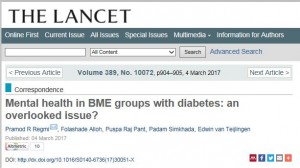
Prof. Edwin van Teijlingen
CMMPH
References:
- Regmi, P., van Teijlingen, E. ‘Balanced Ethics Review: A Guide for Institutional Review Board Members’ by Whitney, Simon N., Springer, (2015) ISBN: 9783319207056 (pb) (book review), Sociological Research Online 2017; 22(1) http://www.socresonline.org.uk/22/1/reviews/3.html
- Simkhada, P.P., Regmi, P.R., van Teijlingen, E., Aryal, N. Identifying the gaps in Nepalese migrant workers’ health and well-being: A review of the literature, Journal of Travel Medicine (Accepted).
- Smith, G.B., Isaacs, R., Andrews, L., Wee, M.Y.K., van Teijlingen, E., Bick, D.E., Hundley, V. Vital signs and other observations used to detect deterioration in pregnant women: an analysis of vital sign charts in consultant-led maternity units, International Journal of Obstetric Anesthesia (Accepted).
- Regmi, P., Alloh, F., Pant, P.R., Simkhada, P., van Teijlingen, E. (2017) Mental health in BME groups with diabetes: an overlooked issue? The Lancet, 389: 904-905.
- van Teijlingen, E. The medical and social model of childbirth, Kontakt (Accepted.
New book review published by Dr. Pramod Regmi on research ethics
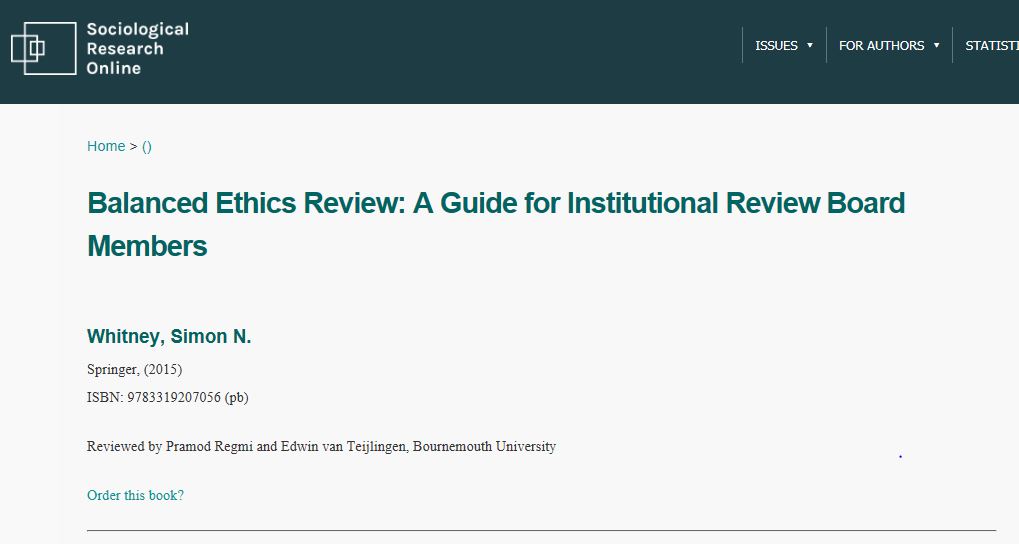 This week saw the publication of the latest issue of the internet-based journal Sociological Research Online. In this issue Dr. Pramod Regmi and Prof. Edwin van Teijlingen published a book review of Balanced Ethics Review: A Guide for Institutional Review Board Members written by the American academic Simon Whitney. [1] In doing so they continue the tradition of FHSS scholars contributing to the research ethics debate. For example, Regmi and colleagues recently had a paper accepted on their insights into research in low-income countries in the journal Developing World Bioethics.[2] Whilst a 2012 FHSS-led paper stressed that researchers conducting research in low-income countries need to apply for research ethics approval to the relevant local authority, if national legislation requires one to do so.[3]
This week saw the publication of the latest issue of the internet-based journal Sociological Research Online. In this issue Dr. Pramod Regmi and Prof. Edwin van Teijlingen published a book review of Balanced Ethics Review: A Guide for Institutional Review Board Members written by the American academic Simon Whitney. [1] In doing so they continue the tradition of FHSS scholars contributing to the research ethics debate. For example, Regmi and colleagues recently had a paper accepted on their insights into research in low-income countries in the journal Developing World Bioethics.[2] Whilst a 2012 FHSS-led paper stressed that researchers conducting research in low-income countries need to apply for research ethics approval to the relevant local authority, if national legislation requires one to do so.[3]
Looking better a little further back, Professor Emerita Immy Holloway wrote about the researcher who may have (potentially) conflicting roles namely those of researcher and health care professional.[4] Whilst a combination of midwifery researchers in the Centre for Midwifery, Maternal & Perinatal Health (CMMPH) highlighted the problems faced by practitioners doing research in their field of practice with perhaps the risk of blurring professional and research ethics, as balancing competing ethical concerns between protecting research participants and over-managing the ethical process can be problematic.[5-6] The latter issue of management and regulation of research ethics has recognised as getting more and more cumbersome and bureaucratic.[7-8]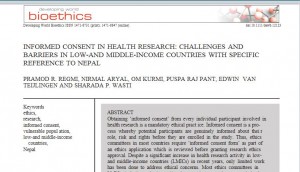
Two further publications by Prof. Ashencaen Crabtree have added to the pool of FHSS publication on research ethics.[9-10] The first one, a book, addressed the problematic issue of gate-keepers in research together with the ethics of critical observation of abuse (potential or actual), as well as the ethics of advocating on behalf of research participants.[9] The second paper covered issues around working with research participants who are regarded as ‘vulnerable’ in a study into the context of care and patient/service user experiences.[10]
Whilst Prof. Parker has highlighted the benefits and dangers of using email and the Internet for social and health research.[11] An even newer research approach is the use of discussion boards as sources of data, which brings its own ethical dilemmas.[12]
In 2010-11 Prof. Parker and colleagues explored in two separate papers the contested meanings and difficulties associated with informed consent, highlighting challenges raised by an almost unquestioned acceptance of biomedical research ethics in social research and questioning whether potential ‘harm’ is different in this context.[13-14]
Prof. Hundley and colleagues discussed the ethical challenges involved in conducting a cluster randomised controlled trial, where getting informed consent can be complication.[15] Whilst it is worth reminding researchers that in issues of informed consent during pregnancy and childbirth one has to consider the potential for harm to two participants.[16]
References
- Regmi, P., van Teijlingen, E. (2017) ‘Balanced Ethics Review: A Guide for Institutional Review Board Members’ by Whitney, Simon N., Springer, (2015) ISBN: 9783319207056 (pb) (book review), Sociological Research Online 22(1) http://www.socresonline.org.uk/22/1/reviews/3.html
- Regmi, PR., Aryal, N., Kurmi, O., Pant, PR., van Teijlingen, E., Wasti, P.P. (forthcoming Informed consent in health research: challenges and barriers in low-and middle-income countries with specific reference to Nepal, Developing World Bioethics.
- van Teijlingen E.R., Simkhada, P.P. (2012) Ethical approval in developing countries is not optional, Journal of Medical Ethics 38:428-430.
- Holloway, I., Wheeler, S. (1995) Ethical Issues in Qualitative Nursing Research, Nursing Ethics 2: 223-232. http://nej.sagepub.com/content/2/3/223.full.pdf+html
- Ryan, K., Brown, B., Wilkins, C., Taylor, A., Arnold, R., Angell, C., van Teijlingen, E. (2011) Which hat am I wearing today? Practicing midwives doing research, Evidence-Based Midwifery 9(1): 4-8.
- van Teijlingen, E.R., Cheyne, H.L. (2004) Ethics in midwifery research, RCM Midwives Journal 7 (5): 208-10.
- van Teijlingen, E. (2006) Reply to Robert Dingwall’s Plenary ‘Confronting the Anti-Democrats: The unethical Nature of Ethical Regulation in Social Science, MSo (Medical Sociology online) 1: 59-60 www.medicalsociologyonline.org/archives/issue1/pdf/reply_rob.pdf
- van Teijlingen, E., Douglas, F., Torrance, N. (2008) Clinical governance and research ethics as barriers to UK low-risk population-based health research? BMC Public Health 8(396) www.biomedcentral.com/content/pdf/1471-2458-8-396.pdf
- Ashencaen Crabtree, S. (2012) Rainforest Asylum: The enduring legacy of colonial psychiatric care in Malaysia, London: Whiting & Birch.
- Ashencaen Crabtree, S. (2013) Research ethics approval processes and the moral enterprise of ethnography. Ethics & Social Welfare. Advance Access: DOI:10.1080/17496535.2012.703683
- Bond, C.S, Ahmed, O.H., Hind, M., Thomas, B., Hewitt-Taylor, J. (2013) The Conceptual and Practical Ethical Dilemmas of Using Health Discussion Board Posts as Research Data, Journal of Medical Internet Research 15(6):e112) Web address: http://www.jmir.org/2013/6/e112/
- Parker, J. (2008) Email, ethics and data collection in social work research: some reflections from a research project, Evidence & Policy: A Journal of Research, Debate & Practice, 4(1): 75-83.
- Hundley, V., Cheyne, H.C., Bland, J.M., Styles, M., Barnett, C.A. (2010) So you want to conduct a cluster randomised controlled trial? Lessons from a national cluster trial of early labour, Journal of Evaluation in Clinical Practice 16: 632-638
- Helmreich, R.J., Hundley, V., Norman, A., Ighedosa, J., Chow, E. (2007) Research in pregnant women: the challenges of informed consent, Nursing for Women’s Health 11(6): 576-585.
- Parker, J., Penhale, B., Stanley, D., (2010). Problem or safeguard? Research ethics review in social care research and the Mental Capacity Act 2005. Social Care & Neurodisability, 1(2): 22-32.
- Parker, J., Penhale, B., Stanley, D. (2011) Research ethics review: social care and social science research and the Mental Capacity Act 2005, Ethics & Social Welfare, 5(4): 380-400.
CQR Narrative Group Welcomes a Student Research Assistant
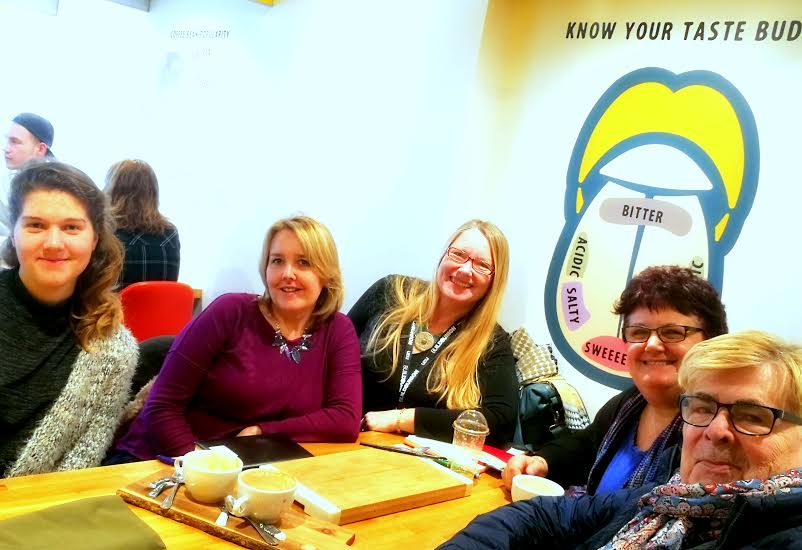
Figure 1 Guste Kalanaviciute, Lee-Ann Fenge, Anne Quinney, Jen Leamon & Kip Jones
The Centre for Qualitative Research (CQR) Narrative group, a centre of the Faculty of Health & Social Sciences (FHSS) is an interprofessional group, with representation from across social work, nursing, midwifery, physiotherapy, education practice and media production. We have an interest in how stories and dialogue can be used to create meaning and understanding, and in particular how novel and creative methods can be used to support both the collection of data and the dissemination of findings. This includes the use of film as a method of sharing findings as well as public engagement
Over the last few years we have run numerous seminars, and public engagement events (as part of the HEA workshop series, Festival of Social Science and BU’s own Festival of Learning https://vimeo.com/174549052).
We are delighted to have a student research assistant, Guste, join us to help explore the mountains of narrative data we have accumulated over several years of community activities. As part of her work with us, we hope to develop a digital story around the meanings attached to health and well-being as well exploring opportunities for a publication.
Guste reports:
I am very grateful for this amazing opportunity to join such a friendly group of people and gain invaluable experience for my future career. At first I felt a bit overwhelmed with all the new information as I am only a first year Psychology student and do not yet have experience with qualitative data. However, Lee-Ann was very supportive, assured me that with time the skills will come and set me off to start my journey by reading around qualitative data and themes of health and well-being. So far I have read some papers around these topics, a few of Lee-Ann’s and Kip’s publications, watched clips of their past projects (Seen but Seldom Heard; Rufus Stone) and met the team in person to discuss our next steps. Everything is going well now, will start looking into some of the data they have collected, try to find emerging themes and report it for the feedback.
Professor Jo Adams Keynote PPI Seminar
Making research meaningful and accessible to patients: Why patient and public involvement is crucial to designing effective health research studies
Date Monday 6th March 2017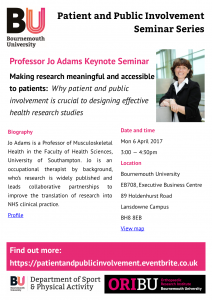
Time 3:00 – 4:30 pm
Location EB708, Executive Business Centre, 89 Holdenhurst Road, Lansdowne Campus, Bournemouth University
As part of the Public and Patient Involvement (PPI) in Research seminar series
Biography
Dr Jo Adams is a Professor of Musculoskeletal Health within the Faculty of Health Sciences, University of Southampton. Jo is an occupational therapist by background. She has led both national and international applied translational research programmes related to developing effective self- management approaches for individuals with musculoskeletal diseases. Her research is widely published and she leads collaborative partnerships to improve the translation of research into NHS clinical practice. She is also an experienced educator having taught health care professionals at pre and post registration level for over 20 years
Book your place now: https://patientandpublicinvolvement.eventbrite.co.uk
Refreshments are available and there will be plenty of time for discussion at the seminar end. Any questions please contact:
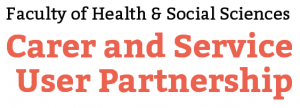
Dr James Gavin
Email jgavin@bournemouth.ac.uk
Phone +44 (0)1202566303
From Nepal, to BU and back again
Recent BU graduate Dr Pratik Adhikary is currently working alongside BU researcher Professor Edwin van Teijlingen and the Centre of Midwifery, Maternal and Perinatal Health (CMMPH) in Nepal.
The CMMPH have been working on improving maternity care in Nepal for a number of years. They’ve most recently begun looking at the impact of women’s groups on maternal and child health uptake in Pharping- rural Nepal.
A former BU PhD student, Dr Adhikary is in charge of planning and monitoring the study, as well as training local Nepalese data collectors. He also looks after the data entry and the overall evaluation of the study.
As well as this, Newton funding is offering him his first fieldwork post as an independent researcher. Below we follow his journey from a former BU student to a BU staff member.
“I’m originally from Nepal and came to Bournemouth University in 2009 to study for my PhD. This looked at Nepalese migrant workers working in the Middle East and Malaysia – this focused on their physical and mental health, as well as any risks they took in their jobs. Previously, I studied for an MSc in Public Health at the University of Aberdeen, as well as working as a cardiac data collection officer in Aberdeen Royal Infirmary,” says Dr Adhikary.
“Studying at BU was very important for my academic career. I was lucky enough to present my PhD study at an international conference, which provided me with useful feedback from both academics and early career researchers,”
“My academic supervisors Prof van Teijlingen and Dr Steven Keen were instrumental throughout my PhD- in gaining a partial fee waiver, international travel funds to attend conferences and arranging a grant from the open society foundation,”
“As a young researcher, I am planning a number of drafts for publication in 2017. Support from my BU colleagues has given me a unique stepping stone in the academic world,”
“Being at BU has enabled me to grow my researcher’s network and provided me with an insight into the some of the highest quality of research in the world,” says Dr Adhikary, “I’ve always felt at home at BU and I’m keen to continue my research career here! “
You can read one of Dr Adhikary’s PhD papers online for free here
Dr Adhikary was also a co-author on this recent 2016 paper on the BU Research Blog
Public & Patient Involvement (PPI) – Seminar Series
Bournemouth University will be hosting a Public Involvement seminar series throughout March and April, which focusses upon the public/patients working with staff to: 1) prioritise research; 2) advise upon project methodology; 3) design recruitment campaigns; 4) develop research materials; and 5) promote the impact of findings.
Patient and Public Involvement (PPI) has broad application to research beyond Health and Social Care, allowing the public actively act as participants. Direct benefits to researchers include: ensuring research quality, credibility and relevance; public accountability and insights; and enhancing research funding.
Students, staff and the public are invited to the seminar series. UGR and PGR students attending three or more seminars will be eligible to apply for an opportunity to run their own PPI advisory group with hip-replacement patients. This will be supported by ORI and the Department of Sport and Physical Activity, and has ongoing potential for conference presentation and journal article preparation.
Patient & Public Involvement (PPI) Seminar Series
Location EB708, Executive Business Centre, Lansdowne Campus
Monday 6th March, 3-4.30 pm
Why PPI is crucial to designing effective health research studies
Professor Jo Adams, Professor Musculoskeletal Health, University of Southampton
Wednesday 15th March, 3-4.30 pm
Importance of public involvement in research design: an orthopaedic case study
Lisa Gale-Andrews & Dr Zoe Sheppard, Faculty of Health and Social Sciences, Bournemouth University
Monday 3rd April, 3-4.30 pm
Recruiting and supporting participants to engage in meaningful PPI
Dr Mel Hughes & Angela Warren, Carer and Service User Partnership, Bournemouth University
Monday 24th April, 11-12.30 pm
How can today’s patient help research tackle tomorrow’s health challenges?
Simon Denegri National Director, Patients and the Public in Research (INVOLVE)
Book your place now: https://patientandpublicinvolvement.eventbrite.co.uk
Refreshments are available and there will be plenty of time for discussion at the seminar end. Any questions please contact:

Dr James Gavin
Email jgavin@bournemouth.ac.uk
Phone +44 (0)1202566303
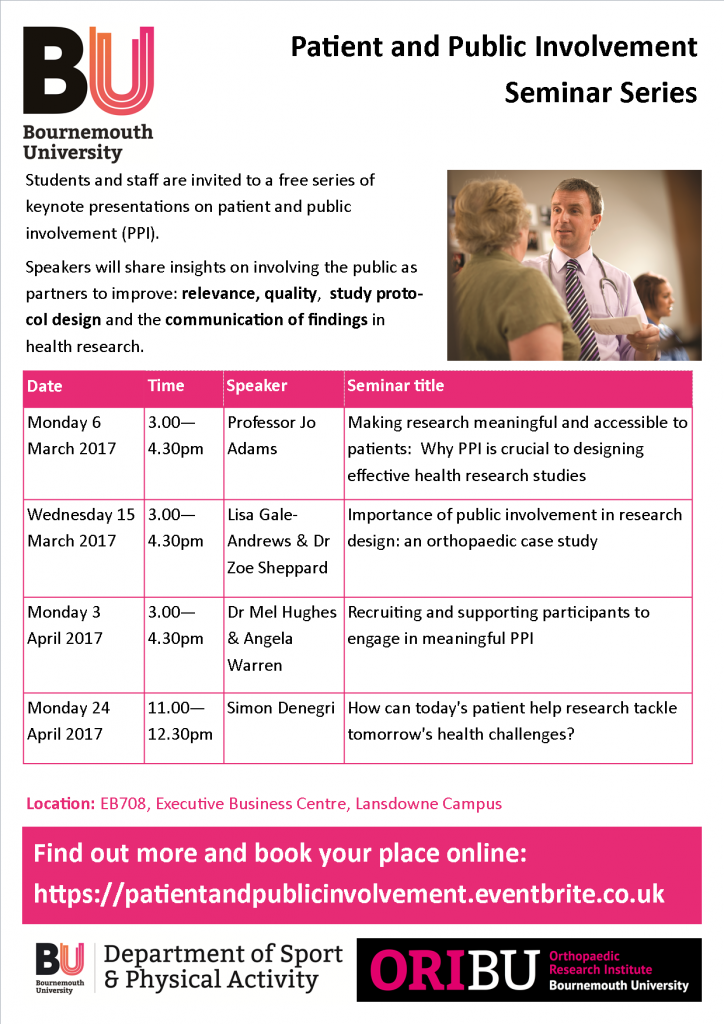
Phone +44 (0)1202566303
Patient and Public Involvement Seminar Series
Dr James Gavin is running a free series of seminars on patient and public involvement (PPI).
James Gavin is running a free series of seminars on patient and public involvement (PPI).
This series will highlight the importance of PPI throughout the research cycle, from design to dissemination. PPI is gaining importance to identify treatments that meet people’s needs and are more likely to be adopted in practice.
Speakers will share insights on involving the public as partners to improve: relevance, quality, study protocol design and the communication of findings in health research. The speakers are from a variety of roles in occupational therapy, mental health, social work, health demographics, education and national health governance.
To find out more information and to book your place please click here.
| Date | Location | Time | Speaker | Seminar Title |
| Monday 6 March 2017 | EB708, Lansdowne Campus | 3.00-4.30pm | Professor Jo Adams | Making research meaningful and accessible to patients: Why PPI is crucial to designing effective health research studies |
| Wednesday 15 March 2017 | EB708, Lansdowne Campus | 3.00-4.30pm | Lisa Gale-Andrews & Dr Zoe Sheppard | Importance of public involvement in research design: an orthopaedic case study |
| Monday 3 April 2017 | EB708, Lansdowne Campus | 3.00-4.30pm | Dr Mel Hughes & Angela Warren | Recruiting and supporting participants to engage in meaningful PPI |
| Monday 24 April 2017 | EB708, Lansdowne Campus | 11.00am-12.30pm | Simon Denegri | How can today’s patient help research tackle tomorrow’s health challenges? |
New Post-doc says ‘Hi’

Hi all,
This is just a quick post to introduce myself – I started in January as a Post-doctoral Research Fellow in the Faculty of Human Sciences and Public Health, and am working on the Implementing Nutrition Screening in Community Care for Older People (INSCCOPe) project (led by Professor Jane Murphy).
This project explores factors that may promote or inhibit successful implementation, and embedding in routine practice, of a new procedure for screening and treatment of malnutrition by integrated community teams (ICTs). The procedure is currently in development as part of service improvement work within Southern Health NHS Foundation Trust, and the INSCCOPe project will run in parallel. The project will run for 14 months, and is informed by Normalisation Process Theory (NPT) (http://www.normalizationprocess.org/).
I’ve been made to feel very welcome in my short time at BU, and look forward to meeting new people in the faculty in future. Below is a short summary of my background and current research/development interests.
Kind regards,
Mike.
(p.s. apologies if you’re seeing this for the second time – I initially sent this around the HSS-staff list by mistake)
Dr. Mike Bracher (Post-doctoral Research Fellow, INSCCOPe project)
Faculty of Health and Social Sciences, Department of Human Sciences and Public Health, Bournemouth University.
Background:
- I’m health sciences researcher with a social science background, and the majority of my research experience has been in the areas of autism and cancer.
- I completed my PhD, an exploration of pre-diagnostic identity formation in the lives of people diagnosed with Asperger Syndrome in adulthood, at the University of Southampton from 2009-2013.
- Following this, I completed a service evaluation and development project at the Autism Diagnostic Research Center (ADRC Southampton), which explored post-diagnostic support needs.
- In February 2014, I moved to the Faculty of Health Sciences at the University of Southampton, where I worked as part of a team to produce the first analysis of free-text survey responses from a national (Wales) sample of cancer patients (http://bmjopen.bmj.com/content/6/9/e011830).
- I was also involved in methodological developments in the application of text mining to analyses of free-text responses from large surveys (http://bmjopen.bmj.com/content/5/10/e007792), and a further analysis of free-text responses from patients in England who had been diagnosed with cancer of unknown primary (CUP).
- From February 2015 to February 2017, I worked as a Research Fellow on the True Nth Decision Support: Understanding Consequences project, a complex intervention aiming to improve treatment decision support for men with low and moderate risk prostate cancer.
Current research interests and professional development aims:
My research interests are in the uses of data from applied health research to drive improvements in healthcare by:
- better understanding the needs of specific populations;
- understanding social and organisational processes that promote or inhibit successful provision of services or implementation of new technologies and innovations;
- developing models and tools from theoretical and empirical knowledge of experiences and/or processes in healthcare, as a basis for service improvement.
My current professional development aims include:
- further development in conversation analysis – conversation analysis offers a set of useful tools to describe and analyse micro-level processes that shape everyday interactions in healthcare settings;
- further development in quantitative data analysis methods, including exploration of epidemiological and psychometric methods;
- programming using Python and R.
Deadline Extended: Machine Learning in Medical Diagnosis and Prognosis
The deadline has been extended to the 14th of April , 2017.
This is a call for papers for the Special Session on Machine Learning in Medical Diagnosis and Prognosis at IEEE CIBCB 2017.
The IEEE International Conference on Computational Intelligence in Bioinformatics and Computational Biology (IEEE CIBCB 2017) will be held at the INNSIDE Hotel, Manchester from August 23rd to 25th, 2017.
This annual conference has become a major technical event in the field of Computational Intelligence and its application to problems in biology, bioinformatics, computational biology, chemical informatics, bioengineering and related fields. The conference provides a global forum for academic and industrial scientists from a range of fields including computer science, biology, chemistry, medicine, mathematics, statistics, and engineering, to discuss and present their latest research findings from theory to applications.
The topics of interest for the special session include (but are not limited to):
- Medical image classification
- Medical image analysis
- Expert systems for computer aided diagnosis and prognosis
- Pattern recognition in the analysis of biomarkers for medical diagnosis
- Deep learning in medical image processing and analysis
- Ethical and Security issues in machine learning for medical diagnosis and prognosis
Up-to-date information and submission details can be found on the IEEE CIBCB 2017. The submission deadline is the 14th of April, 2017.
Please e-mail srostami@bournemouth.ac.uk with any questions.
British Academy Visit – reserve your place now!
 The British Academy is returning to BU on 8 March 2017. This is an invaluable opportunity to find out more about the international and domestic funding available through the organisation. For those of you who are not familiar with the British Academy, it is the UK’s leading independent body for the humanities and social sciences, promoting funding, knowledge exchange and providing independent advice within the humanities.
The British Academy is returning to BU on 8 March 2017. This is an invaluable opportunity to find out more about the international and domestic funding available through the organisation. For those of you who are not familiar with the British Academy, it is the UK’s leading independent body for the humanities and social sciences, promoting funding, knowledge exchange and providing independent advice within the humanities.
The session will last just over 1 hour (13:00-14:15) and will comprise a presentation focusing on international and domestic funding opportunities along with an overview of the British Academy, followed by a Q&A session.
Representatives of the British Academy will be available to answer any individual queries not covered in the presentation or Q&A session, and members of the Research and Knowledge Exchange Office will be on hand should you wish to discuss BU’s processes for bidding to the organisation.
Places for this event can be reserved through Organisational Development here.
New paper published by CMMPH’s Dr. Susan Way
This week saw the pre-publication of ‘Core principles to reduce current variations that exist in grading of midwifery practice in the United Kingdom’ in Nurse Education in Practice. This paper is co-authored by Dr. Susan Way in the Centre for Midwifery, Maternal & Perinatal Health (CMMPH). The authors argue that these core principles could contribute to curriculum development in midwifery and other professions internationally.
Congratulations!
Prof. Edwin van Teijlingen
Reference:
- Fisher, M., Way, S., Chenery-Morris, S., Jackson, J., Bower, H.
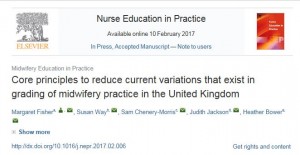 (2017) Core principles to reduce current variations that exist in grading of midwifery practice in the United Kingdom, Nurse Education in Practice (forthcoming) see: http://www.nurseeducationinpractice.com/article/S1471-5953(17)30092-6/abstract
(2017) Core principles to reduce current variations that exist in grading of midwifery practice in the United Kingdom, Nurse Education in Practice (forthcoming) see: http://www.nurseeducationinpractice.com/article/S1471-5953(17)30092-6/abstract
NIHR webinar: How nurses can build a career in research – 11am on Wednesday 22 Feb
Nurses are in a unique position on the frontline to see where the gaps are in delivering care and what questions need answering. Pursuing a clinical academic career can provide a stimulating and rewarding career pathway.
Training and career development awards from the National institute for Health Research (NIHR) range across all levels, are open to a wide range of professions and are designed to suit different working arrangements and career pathways.
This special one hour webinar, specifically for nurses, will explore the opportunities available to nurses from the NIHR to pursue a clinical academic career.
This webinar will cover:
- An overview of the funding opportunities available from the NIHR for nurses to pursue a clinical academic career
- Details about the HEE/NIHR Integrated Clinical Academic Programme (for non-medical professions) – including advice and guidance on applying
- Some of the challenges nurses can face and tips on how to overcome them
- A live Q&A session
The webinar will be presented by Dr Pete Thompson, Assistant Director at the NIHR Trainees Coordinating Centre and HEE/NIHR Senior Clinical Research Fellow Kirsty Winkley, Specialist Diabetes Nurse.
You can register for the webinar via the following link: http://bit.ly/researchcareersfornurses
If you have any issues when registering please email tcc@nihr.ac.uk.
Don’t forget, your local branch of the NIHR Research Design Service is based within the BU Clinical Research Unit (BUCRU) on the 5th floor of Royal London House. Feel free to pop in and see us, call us on 61939 or send us an email.











 1 WEEK REMAINING- Postgraduate Research Experience Survey (PRES) 2024
1 WEEK REMAINING- Postgraduate Research Experience Survey (PRES) 2024 Conversation article: How 2-Tone brought new ideas about race and culture to young people beyond the inner cities
Conversation article: How 2-Tone brought new ideas about race and culture to young people beyond the inner cities Upcoming 3C Event – PGR Culture, Community & Cake
Upcoming 3C Event – PGR Culture, Community & Cake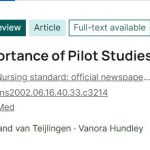 Paper with 160,000 reads
Paper with 160,000 reads Apply for up to £1,000 to deliver an event and take part in a national festival of public engagement with research
Apply for up to £1,000 to deliver an event and take part in a national festival of public engagement with research MSCA Postdoctoral Fellowships 2024
MSCA Postdoctoral Fellowships 2024 Horizon Europe News – December 2023
Horizon Europe News – December 2023